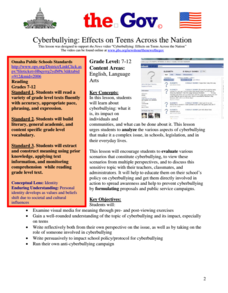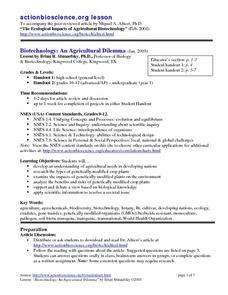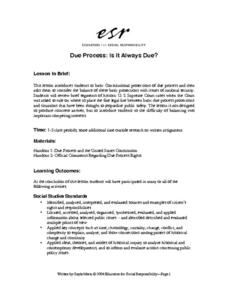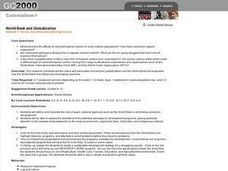Museum of Tolerance
Disenfranchised People of the New Nation
Why are some immigrant groups in the United States embraced while others become disenfranchised? To answer this question, teams investigate why groups emigrated to the US, why some of these these peoples were...
Los Angeles County Office of Education
Assessment for the California Mathematics Standards Grade 1
Here is an assessment designed to test mathematicians' knowledge of writing numbers, comparing numbers, skip counting, solving addition and subtraction problems; along with measuring objects, telling time, identifying shapes, reading...
Los Angeles County Office of Education
Assessment for the California Mathematics Standards Grade 3
Assess scholars' knowledge with a 22-page assessment that covers place value, patterns, probability, estimation, measurement, geometric figures; and their ability to add, subtract, multiply and divide proficiently.
Curated OER
Cyberbullying: Effects on Teens Across the Nation (Segment 3)
Free speech, privacy, and cyberbullying are the focus of a series of activities that prompt class members to engage in discussions about these interrelated topics. They view a segment from PBS’s series on bullying, read...
Los Angeles County Office of Education
Assessment for the California Mathematics Standards Grade 2
Test scholars mathematic skills with an assessment addressing addition, subtraction, multiplication, place value, measurement, geometric shapes, expanded notation; and their ability to compare numbers, write number...
Agriculture in the Classroom
Growing a Nation: Into a New Millennium 1970-Present
If you want to focus on critical thinking skills, this well-constructed series of activities will challenge your history or agriculture class to evaluate the effectiveness of administrative decisions related to agricultural and the...
Institute of Electrical and Electronics Engineers
Cracking the Code
Some interesting reading on the history of barcodes opens this technology lesson plan. Readers find out how engineers contribute, and then they gather into groups to discuss possible improvements to our current UPC barcode system. Know...
Library of Congress
Thomas Jefferson's Library: Making the Case for a National Library
The United States Library of Congress, the largest library in the world. But such was not always the case. The library was destroyed during the War of 1812. In a persuasive letter to Samuel H. Smith, Thomas Jefferson offered to sell his...
National Endowment for the Humanities
Lesson 1: The United States Confronts Great Britain, 1793–1796
After the Revolutionary War, the success of the United States was far from guaranteed. Foreign powers coveted the new land, and Great Britain challenged American sovereignty. Learners consider the challenges facing the new nation using...
Scholastic
Consider the Source
Who is more trustworthy when it comes to marijuana: a high school student, or The National Institute on Drug Abuse? Sources matter when reading informational text. Help teenagers discern which facts are true with an activity that focuses...
Curated OER
French Standards
Students are introduced to the national standards of France's high schools. Using these standards, they analyze the French grading system. They develop a list of common French words and compare and contrast a French high school to their...
Curated OER
National Forests of Wisconsin and Puerto Rico
Fifth graders study the forests of Wisconsin and Puerto Rico. They view a Power Point presentation and predict slides to represent various forests in Wisconsin and Puerto Rico. They play a game to recognize differences and similarities...
Curated OER
The Bill of Rights in Times of National Crisis
Learners examine the ability of the government to suspend individual rights in times of national crisis. They formulate a constitutional amendment that clearly states if, when, how and by whom the rights of individuals can be suspended.
Curated OER
World War Ii - Japanese American Internment
Ninth graders determine that nationality is not defined by race, especially in the United States. They group into teacher created dyads with eight pictures. Four pictures are of American citizens (multiracial representations), and...
Curated OER
Biotechnology: An Agricultural Dilemma
Students investigate the types of genetically modified crop plants there are and the benefits and risks of such plants. The agricultural needs in developing nations for this biological knowledge to resolve societal issues is also...
Curated OER
Due Process: Is It Always Due?
Students explore the basic Constitutional protections of due process and then consider the balance of these basic protections with issues of national security. A variety of segments of U.S. Supreme Court cases are examined in this lesson.
Curated OER
Canaima
High schoolers analyze the meaning and uses of definite articles in Spanish. They read a pamphlet on the national park in Canaima, Venezuela, and discuss the similarities and differences between national parks in the U.S. and Venezuela.
Curated OER
Exploring Canadian Heritage
Young scholars use the online Atlas as a research tool to find information on national parks and world heritage sites.
Curated OER
Should America Balance the Federal Budget?
Students analyze the federal budget of the United States. In this national debt activity, students listen to their instructor present a lecture regarding the details of the balancing the federal budget. Students respond to discussion...
Curated OER
World Bank and Globalization
Learners define and describe the role of the World Bank in promoting economic development. They assess the benefits and potential damages to development programs. They evaluate how the World Bank has influenced developing countries.
Curated OER
A World of Money
Young scholars explore the traditions related to the creation of national currencies. The role currency plays in shaping a national or regional identity and the influences that the designers of world currency exert are examined in this...
Curated OER
Exploring the History of Oil
Students investigate oil's changing role in human history. They view a PBS documentary, conduct Internet research, complete a research matrix, and write an essay on whether they support an expansion of oil drilling in the Arctic...
Curated OER
Rhythm In Motion
Sixth graders work independently and with a partner to demonstrate proficiency of steady beat, meter and basic note values while creating written rhythmic patterns for class performance. State and National Standards are addressed.
Curated OER
Starting at the Beginning
Sixth graders develop basic band skills through in-class instruction, individual practice, and the Essential Elements band method. Instruction is teacher-led with examples and drill/practice. National Standards for the arts are...

























